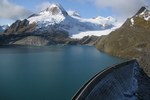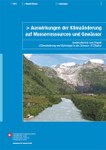News
Alpine water resources in private hands?
Feb 15, 2013
/
alpMedia
The proposal from Brussels on the privatisation of water supplies is making waves on account of the content of the regulation and also the successful citizens' initiative that aims to stop it. Finally, this article explains why a joint strategy is needed, both for the Alpine space and for Europe.

Image caption:
The Alps, Europe's water reservoir: in 2010 the United Nations recognised the right to clean water as a human right and declared 2013 as the International Year of Water Cooperation. (c) Daniel Zupanc
The new directive is in fact intended to provide clarity regarding the granting of concessions for the supply of drinking water: if municipalities fully or partially privatise the organisation of their water supplies, all calls for tenders must in future be made on an EU-wide basis, with orders going to the best bid. Municipalities have in the past themselves been able to decide who will supply their citizens with drinking water, under what conditions.
Privatisation via the back door
The proposed legislation, to be debated this spring in the European Parliament, has caused uproar. Municipal associations warn that local businesses will not be able to compete with large corporations. Price, quality and environmental protection regulations will be difficult to enforce, with expensive, poor quality water the result. This is exactly what happened in the cities of Grenoble and Klagenfurt where the water supply was privatised. Today it is back in public hands. The City of Grenoble is even officially supporting the European Citizens' Initiative, "Water is a Human Right". One million European Union citizens have already signed it, demanding that the European Commission "excludes water services from the liberalisation agenda".
Where, as of 2020, more than 80% of turnover is within their boundaries, municipalities will be exempted from the obligation to call for tenders. Public utilities however often provide gas and electricity alongside water, and sometimes also supply neighbouring locations. As electricity often represents more than 20% of turnover, drinking water supplies must in future be subject to the bidding process. Critics denounce this as privatisation through the back door. In Brussels the debate is regarded as a storm in a teacup.
A common strategy for the Alpine space
Privatisation means more competition, while at the same time the demand for water as a resource will rise. Scientists forecast that climate change - less rain, drier summers and significantly less snow in winter - will severely limit the availability of water from the Alps. Conflicts will accordingly increase between the drinking water supply, the energy industry, tourism and nature protection. Alpine rivers today supply water to 170 million people. CIPRA is thus demanding that sovereignty over water should remain in public hands and not be handed over to individual corporations: what is rather needed is a joint strategy by the Alpine states and the European Union for the sustainable management of water. Responsibility for the sustainable use of water in the Alpine space will be a subject of discussion at the annual CIPRA conference to be held in Italy in autumn 2013.
Link to the Citizens' Initiative, the CIPRA compact on water and climate change, the proposed EU directive and sources: www.cipra.org/de/alpmedia/dossiers/23, http://derstandard.at/1358304543578 (de), www.wdr.de/tv/monitor//sendungen/2012/1213 (de), http://jetzt.sueddeutsche.de/texte/anzeigen/564942 (de), www.partagedeseaux.info/article474.html?id (fr), www.right2water.eu,
www.europarl.europa.eu/document/activities
Privatisation via the back door
The proposed legislation, to be debated this spring in the European Parliament, has caused uproar. Municipal associations warn that local businesses will not be able to compete with large corporations. Price, quality and environmental protection regulations will be difficult to enforce, with expensive, poor quality water the result. This is exactly what happened in the cities of Grenoble and Klagenfurt where the water supply was privatised. Today it is back in public hands. The City of Grenoble is even officially supporting the European Citizens' Initiative, "Water is a Human Right". One million European Union citizens have already signed it, demanding that the European Commission "excludes water services from the liberalisation agenda".
Where, as of 2020, more than 80% of turnover is within their boundaries, municipalities will be exempted from the obligation to call for tenders. Public utilities however often provide gas and electricity alongside water, and sometimes also supply neighbouring locations. As electricity often represents more than 20% of turnover, drinking water supplies must in future be subject to the bidding process. Critics denounce this as privatisation through the back door. In Brussels the debate is regarded as a storm in a teacup.
A common strategy for the Alpine space
Privatisation means more competition, while at the same time the demand for water as a resource will rise. Scientists forecast that climate change - less rain, drier summers and significantly less snow in winter - will severely limit the availability of water from the Alps. Conflicts will accordingly increase between the drinking water supply, the energy industry, tourism and nature protection. Alpine rivers today supply water to 170 million people. CIPRA is thus demanding that sovereignty over water should remain in public hands and not be handed over to individual corporations: what is rather needed is a joint strategy by the Alpine states and the European Union for the sustainable management of water. Responsibility for the sustainable use of water in the Alpine space will be a subject of discussion at the annual CIPRA conference to be held in Italy in autumn 2013.
Link to the Citizens' Initiative, the CIPRA compact on water and climate change, the proposed EU directive and sources: www.cipra.org/de/alpmedia/dossiers/23, http://derstandard.at/1358304543578 (de), www.wdr.de/tv/monitor//sendungen/2012/1213 (de), http://jetzt.sueddeutsche.de/texte/anzeigen/564942 (de), www.partagedeseaux.info/article474.html?id (fr), www.right2water.eu,
www.europarl.europa.eu/document/activities




